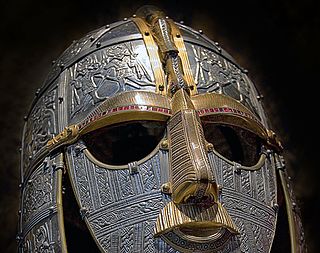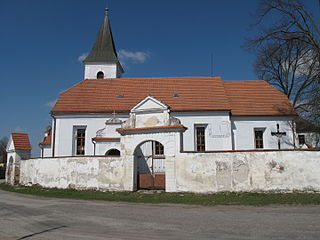Other uses
- Modra, Anglo-Saxon supernatural figures - see List of Anglo-Saxon deities
- Modra (film), a 2010 Canadian drama
Modra is a city and municipality in Slovakia.
Modra may also refer to:
OS, O.S., Os, O's, or os may refer to:
Old English, or Anglo-Saxon, is the earliest recorded form of the English language, spoken in England and southern and eastern Scotland in the early Middle Ages. It developed from the languages brought to Great Britain by Anglo-Saxon settlers in the mid-5th century, and the first Old English literary works date from the mid-7th century. After the Norman conquest of 1066, English was replaced, for a time, by Anglo-Norman as the language of the upper classes. This is regarded as marking the end of the Old English era, since during this period the English language was heavily influenced by Anglo-Norman, developing into a phase known now as Middle English in England and Early Scots in Scotland.

The Saxons were a group of Germanic peoples whose name was given in the early Middle Ages to a large country near the North Sea coast of northern Germania, in what is now Germany. In the late Roman Empire, the name was used to refer to Germanic coastal raiders, and in a similar sense to the later "Viking". Their origins are believed to be in or near the German North Sea coast where they appear later, in Carolingian times. In Merovingian times, continental Saxons had been associated with the activity and settlements on the coast of what later became Normandy. Their precise origins are uncertain, and they are sometimes described as fighting inland, coming into conflict with the Franks and Thuringians. There is possibly a single classical reference to a smaller homeland of an early Saxon tribe, but its interpretation is disputed. According to this proposal, the Saxons' earliest area of settlement is believed to have been Northern Albingia. This general area is close to the probable homeland of the Angles.
Year 605 (DCV) was a common year starting on Friday of the Julian calendar. The denomination 605 for this year has been used since the early medieval period, when the Anno Domini calendar era became the prevalent method in Europe for naming years.

The Anglo-Saxons were a cultural group that inhabited much of what is now England in the Early Middle Ages, and spoke Old English. They traced their origins to Germanic settlers who came to Britain from mainland Europe in the 5th century. Although the details are not clear, their cultural identity developed out of the interaction of these settlers with the pre-existing Romano-British culture. Over time, most of the people of what is now southern, central, northern and eastern England came to identify as Anglo-Saxon and speak Old English. Danish and Norman invasions later changed the situation significantly, but their language and political structures are the direct predecessors of the medieval Kingdom of England, and the Middle English language. Although the modern English language owes somewhat less than 26% of its words to Old English, this includes the vast majority of words used in everyday speech.

Bolu Province is a province situated in north-western Turkey. It is located between the capital, Ankara, and the largest city in the country, Istanbul. Its area is 8,313 km2, and its population is 320,824 (2022). The capital city of the province is Bolu.
Dane or Danes may refer to:

West Stow is a small village and civil parish in West Suffolk, England. The village lies north of Bury St. Edmunds, south of Mildenhall and Thetford and west of the villages of Culford and Ingham in the area known as the Breckland. This area is located near the Lark River Valley and was settled from around AD 420–650. West Stow Hall is to the north of the village.

Modra is a city and municipality in the Bratislava Region in Slovakia. It has a population of 9,042 as of 2018. It nestles in the foothills of the Malé Karpaty and is an excellent centre of hiking.

Anglo-Saxon paganism, sometimes termed Anglo-Saxon heathenism, Anglo-Saxon pre-Christian religion, or Anglo-Saxon traditional religion, refers to the religious beliefs and practices followed by the Anglo-Saxons between the 5th and 8th centuries AD, during the initial period of Early Medieval England. A variant of Germanic paganism found across much of north-western Europe, it encompassed a heterogeneous variety of beliefs and cultic practices, with much regional variation.
Ælfric is an Anglo-Saxon given name, consisting of the elements ælf, "elf" and ric, "a powerful person, ruler".
Helenopolis or Drepana (Δρέπανα) or Drepanon (Δρέπανον) was an ancient Greco-Roman and Byzantine town in Bithynia, Asia Minor, on the southern side of the Gulf of Astacus. It has been identified with the modern village of Hersek, in the district of Altınova, Yalova Province. It is traditionally considered as the birthplace of Saint Helena.
Mōdraniht or Modranicht was an event held at what is now Christmas Eve by Anglo-Saxon pagans. The event is solely attested by the medieval English historian Bede in his eighth-century Latin work De temporum ratione. It has been suggested that sacrifices may have occurred during this event. Scholars have proposed connections between the Anglo-Saxon Mōdraniht and events attested among other Germanic peoples, and the Germanic Matres and Matronae, female beings attested by way of altar and votive inscriptions, nearly always appearing in trios.

Modrá Hůrka is a municipality and village in České Budějovice District in the South Bohemian Region of the Czech Republic. It has about 100 inhabitants.

Modrá is a municipality and village in Uherské Hradiště District in the Zlín Region of the Czech Republic. It has about 700 inhabitants.
Egmond may refer to:
Hyglac is an early Germanic personal name, known through northern Europe, Scandinavia and Anglo-Saxon England. It derives from Proto-Germanic *Hugilaikaz, from *hugjaną "courage" + -laikaz ("ritual").
Odda may refer to:
Modra was a town of ancient Bithynia. According to Strabo, the town was situated in Phrygia Epictetus, at the sources of the river Gallus. This river flows down from the northern slope of the Bithynian Olympus, forming the boundary between Phrygia and Bithynia, Strabo must be mistaken, and Modra probably belonged to the southwest of Bithynia. It became the seat of a bishop; no longer a residential see, it remains a titular see of the Roman Catholic Church. The district about Modra was called Modrene.